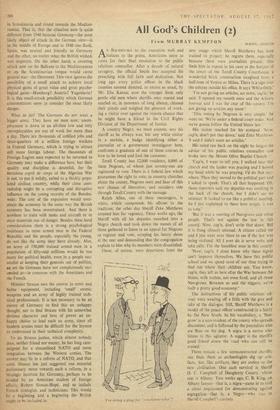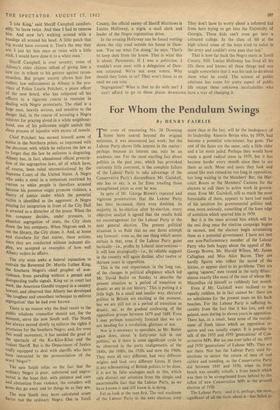All God's Children (2)
AS BOLSHENRKS to the execution wall and Italians to the priest, Americans seem to come for their final revelation to the public relations counsellor. After a decade of natural savagery, the official South has accepted his preaching with full faith and dedication. Not long ago every police officer in the black counties seemed directed, to excess as usual, by Mr. Ella Kazan; now the voyager finds only gentle old men where sheriffs once roared and snarled or, in moments of long silence, cleaned their pistols and weighed the pleasure of work- ing a visitor over against the remote chance that he might have a friend in the Civil Rights Division of the Department of Justice.
A country Negro, we must assume, sees his sheriff as he always was; but any white visitor in a necktie, a badge identifying either a journalist or a government investigator here, confronts a graduate of one of those courses in how to be loved and fool the customer.
Terell County has 12,000 residents, 8,000 of them Negroes, of whom just seventy-one are registered to vote. There is a federal law which guarantees the right to vote; in country churches about the county, Negroes meet and hear of this new chance of liberation; and outsiders ride through Ter& County with the message.
Ralph Alien, one of these messengers, is white, which compounds his affront to the tradition; the other day Sheriff Zeke Matthews arrested him for vagrancy. Three weeks ago, the Sheriff with all his deputies marched into a Negro church and took down the names of all those gathered to listen to an appeal for Negroes to register and vote, scraping his heavy shoes at the rear and demanding that the congregation explain to him why its members were dissatisfied.
These, of course, were departures from the
doing a phig for "1'1)1I- A 110IS"-II•hri.:"
new image which Sheriff Matthews has been trained to project; he regrets them, especially because there were journalists present. One finds him in repose in his cave at the bottom of the tower of the Terell County Courthouse, a wonderful brick construction imagined from a half-tone of Venice or Milan. There is a sign over the ashtray outside his office, It says 'White Only.' 'I'm not giving no articles, no more, cap'n,' he said. 'I opened my mouth once and the Atlanta Journal said I was the czar of this county. I'm not giving no articles any more.'
'This voting by Negroes is very simple.' he went on. 'We're under a federal court order. And we're gonna follow the United States law.'
His visitor reached for his notepad. 'Now, cap'n, don't put that down,' said Zeke Matthews. 1 said I didn't want no articles.'
His mind ran back on the night he forgot ;he advice of his public relations counsellor and broke into the Mount Olive Baptist Church.
'Can't), I want to tell you, I walked into that church and the leader was praying and I bowed my head while he was praying. I'd do that any- where. Then they moved to the political part and I asked to speak. That's all that happened. Oh, those reporters said my deputies was smoking in the back of the church, but I didn't see no minister, It looked to me like a political meeting. So I just explained to them how simple it was to vote.'
'But it was a meeting of Nee-grows and white people. That's not against the law in this county. Now, cap'n, don't write that down. But it is (long silence) unusual. A citizen called me and I just went over there to see if the law was being violated. All I ever do is serve writs and take calls. Fm the humblest man in this county.
'Now, cap'n, I doan know why these nigras can't improve themselves. We have this public school and we spend most of our time trying to find out where their children are. You know, cap'n, they left us here after the War between the States, with nothin, not even food, and all those Nee-grows. Between us and the niggers, we've built a pretty good economy.'
The instructions of his public relations ad- viser were wearing off a little with the give and take of the dialogue. Still, Sheriff Matthews is a model of the peace officer constructed in a hurry by the New South. In his vocabulary, a 'Nee- grow' is a non-resident of the county who spreads discontent, and is followed by the journalists who are fleas on the dog. A nigra is a native who listens to this agitator. A nigger is the sheriff's good friend down the road who can still be trusted.
There remain a few unreconstructed sheriffs; one finds them as archreologists dig up arti- facts, but, like artifacts, they are useless to the new civilisation. One such survival is Sheriff D. C. Campbell of Daugherty County, W hose seat is Albany. Two weeks ago, C. B. King, an Albany lawyer- -that is, a nigra—came in to visit a client imprisoned for demonstrating against segregation—that is, a Negro-- who v—is
Sheriff Campbell's custody. 'I tole King,' said Sheriff Campbell comfort- ably, 'to leave twice. And then I had to remove him. And now he's walking around with a bandage all around his head. A little patch that big would have covered it. That's the way they are. I just hit him once or twice with a little stick. I would have done it to a white man.'
Sheriff Campbell is over seventy; some of Albany's older citizens talked of giving him a new car in tribute to his gesture against recon- struction. But proper society allows him few outlets; law enforcement in Albany is the pro- vince of Police Laurie Pritchett, a peace officer Of the new breed, who has subjected all his officers to a rigorous course in restraint in dealing with Negro protestants. The chief is a huge man, heavily serious, and sensitive to the danger that, in the course of arresting a Negro minister for praying aloud in a white neighbour- hood, one of his policemen might smirch this clean process of injustice with excess of muscle.
Chief Pritchett has earned himself acres of notice in the Northern prints, so impressed with the decorum with which he enforces the law as to forget that the law he enforces is disgusting. Albany has, in fact, abandoned official prescrip- tion of the segregation laws, all of which have, of course, been ruled unconstitutional by the Supreme Court of the United States. A Negro Who seeks a meal in a restaurant restricted by custom to white people is therefore arrested because his presence might promote violence, a theory of justice under which the potential victim is identified as the aggressor. A Negro Praying for integration in front of the City Hall IS arrested as a disturber of the peace. When the bus company decides, under pressure, to abandon segregation of seats, the City shuts down the bus company. When Negroes seek to use the library, the City closes it. And, at home and elsewhere for that matter, these actions, since they are conducted without indecent dis- play, are accepted as examples of how well Albany orders its affairs.
The city even seeks a federal injunction to restrain the Reverend Dr. Martin Luther King, the Southern Negro's chief prophet of non- violence, from parading without a permit and disregarding traffic signals. King sat in court last week, the American Gandhi trapped in a country lawsuit, and observed that Albany has developed the toughest and smoothest technique to enforce segregation' that he had ever known.
There is no reason why the final resort to the Public relations counsellor should not, for the moment, serve the new South well. The North has always moved slowly to, enforce the rights it Proclaims for the Southern Negro; and, for even this small movement, it has needed the goad of the spectacle of the Ku-Klux-Klan and the Violent Sheriff. But is the Department of Justice really equipped to deal with sheriffs who have been instructed in the pronunciation of the Word 'Negro'?
The new South relies on the fact that the ordinary Negro is poor, unlettered and unpro- tected in the hope that, with patierice and care and abstention from violence, the outsiders will s°rne day go away and let things be as they are.
The new South may have calculated every factor but the ordinary Negro. Out in Terell County, the official enemy of Sheriff Matthews is Lucius Holloway, a nigra, a mail clerk and leader of the Negro registration drive.
In the evening Holloway can be found wetting down the clay road outside his house in Daw- son. 'You see what I'm doing,' he says. 'That's to keep dust from the house. That is what this is about. Pavements. If I was a politician, I wouldn't even meet with a delegation of Daw- son coloured. We're not even voters. Why should they listen to us? They won't listen to us until we can vote.
'Segregation? What is that to do with me? I can't afford to go to those places downtown. They don't have to worry abouf a coloured kid from here trying to get into the University of Georgia. These kids can't even get into a coloured college. In the class of '60 at the high school some of the boys tried to enlist in the army and couldn't even pass that test.'
That is how far back the Negro starts in Terell County. Still, Lucius Holloway has lived all his life there and knows all these things and was taught somewhere that it was his task to do about them what he could. The science of public relations has room for every aspect of public life except these unknown incalculables who have a way of changing it.































 Previous page
Previous page